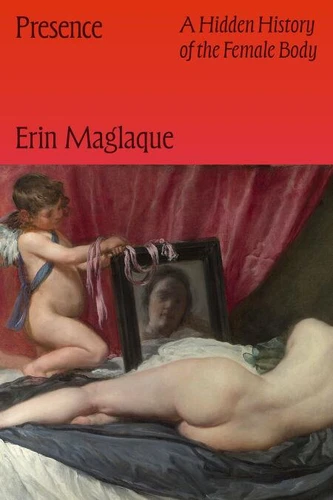Presence. A Hidden History of the Female Body
Par :Formats :
Actuellement indisponible
Cet article est actuellement indisponible, il ne peut pas être commandé sur notre site pour le moment. Nous vous invitons à vous inscrire à l'alerte disponibilité, vous recevrez un e-mail dès que cet ouvrage sera à nouveau disponible.
Disponible dans votre compte client Decitre ou Furet du Nord dès validation de votre commande. Le format ePub protégé est :
- Compatible avec une lecture sur My Vivlio (smartphone, tablette, ordinateur)
- Compatible avec une lecture sur liseuses Vivlio
- Pour les liseuses autres que Vivlio, vous devez utiliser le logiciel Adobe Digital Edition. Non compatible avec la lecture sur les liseuses Kindle, Remarkable et Sony
- Non compatible avec un achat hors France métropolitaine
 , qui est-ce ?
, qui est-ce ?Notre partenaire de plateforme de lecture numérique où vous retrouverez l'ensemble de vos ebooks gratuitement
Pour en savoir plus sur nos ebooks, consultez notre aide en ligne ici
- Nombre de pages304
- FormatePub
- ISBN978-1-6626-0335-8
- EAN9781662603358
- Date de parution16/06/2026
- Protection num.Adobe DRM
- Infos supplémentairesepub
- ÉditeurAstra House
Résumé
A vibrant history of women's bodies, expertise, and work from a major new writer-stylish, revelatory, and liberating. Today, we understand the mind and the body to be distinct; that the mind exercises control over the flesh. But as Erin Maglaque experienced the transformations of pregnancy, abortion, birth, and care-giving, she began to doubt the truth of that dichotomy. In an effort to better understand her experiences, she found herself reaching to the premodern past, a period when the strange rubbed up against the strikingly recognizable: when people accepted both levitation and the smallpox vaccine, witchcraft and universal gravitation; a time when understandings of the body and its capacity for thought were more expansive, and more unruly.
Structured as a biography of the author's own body, from girlhood and adolescence, to sex and abortion, to feeding and caring for an infant, to her experience caring for someone as they were dying, Erin places her personal history into a deep dialogue with the premodern past. She explores the relation between imagination and gender, between maternal and historical subjectivity; she positions female desire as a practice with a past, and offers gentler and more forgiving understandings of housekeeping, pregnancy, early miscarriage, abortion, birth, sleeplessness, and breastfeeding. For readers of Amia Srinivasan's The Right to Sex, Cat Bohannon's Eve, and Olivia Laing's Everybody, Presence is a unique experiment in historical thinking and embodied knowledge; a thoroughly researched, vibrant history of women's bodies, expertise, and work from a major new writer.
Structured as a biography of the author's own body, from girlhood and adolescence, to sex and abortion, to feeding and caring for an infant, to her experience caring for someone as they were dying, Erin places her personal history into a deep dialogue with the premodern past. She explores the relation between imagination and gender, between maternal and historical subjectivity; she positions female desire as a practice with a past, and offers gentler and more forgiving understandings of housekeeping, pregnancy, early miscarriage, abortion, birth, sleeplessness, and breastfeeding. For readers of Amia Srinivasan's The Right to Sex, Cat Bohannon's Eve, and Olivia Laing's Everybody, Presence is a unique experiment in historical thinking and embodied knowledge; a thoroughly researched, vibrant history of women's bodies, expertise, and work from a major new writer.
A vibrant history of women's bodies, expertise, and work from a major new writer-stylish, revelatory, and liberating. Today, we understand the mind and the body to be distinct; that the mind exercises control over the flesh. But as Erin Maglaque experienced the transformations of pregnancy, abortion, birth, and care-giving, she began to doubt the truth of that dichotomy. In an effort to better understand her experiences, she found herself reaching to the premodern past, a period when the strange rubbed up against the strikingly recognizable: when people accepted both levitation and the smallpox vaccine, witchcraft and universal gravitation; a time when understandings of the body and its capacity for thought were more expansive, and more unruly.
Structured as a biography of the author's own body, from girlhood and adolescence, to sex and abortion, to feeding and caring for an infant, to her experience caring for someone as they were dying, Erin places her personal history into a deep dialogue with the premodern past. She explores the relation between imagination and gender, between maternal and historical subjectivity; she positions female desire as a practice with a past, and offers gentler and more forgiving understandings of housekeeping, pregnancy, early miscarriage, abortion, birth, sleeplessness, and breastfeeding. For readers of Amia Srinivasan's The Right to Sex, Cat Bohannon's Eve, and Olivia Laing's Everybody, Presence is a unique experiment in historical thinking and embodied knowledge; a thoroughly researched, vibrant history of women's bodies, expertise, and work from a major new writer.
Structured as a biography of the author's own body, from girlhood and adolescence, to sex and abortion, to feeding and caring for an infant, to her experience caring for someone as they were dying, Erin places her personal history into a deep dialogue with the premodern past. She explores the relation between imagination and gender, between maternal and historical subjectivity; she positions female desire as a practice with a past, and offers gentler and more forgiving understandings of housekeeping, pregnancy, early miscarriage, abortion, birth, sleeplessness, and breastfeeding. For readers of Amia Srinivasan's The Right to Sex, Cat Bohannon's Eve, and Olivia Laing's Everybody, Presence is a unique experiment in historical thinking and embodied knowledge; a thoroughly researched, vibrant history of women's bodies, expertise, and work from a major new writer.



